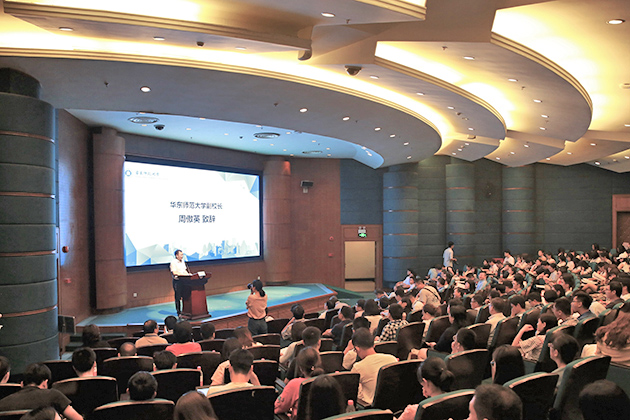China needs to move up value chain in global trading system

From July 6 to 8, the Youth Forum of the National University Collaboration Group on the Discipline of International Trade and the Doctoral Forum of Majors in International Trade and Economics were jointly held at East China Normal University (ECNU) in Shanghai.(ECNU)
The 19th CPC National Congress Report proposed breaking new ground in opening up on all fronts and raising the quality of China’s trade. However, incidents in 2018 have raised concerns about the future of global trade—especially the recent implementation of protectionist policies by the US government. From July 6 to 8, the Youth Forum of National University Collaboration Group on the Discipline of International Trade and the Doctoral Forum of Majors in International Trade and Economics were jointly held at East China Normal University (ECNU) in Shanghai.
With changes in the global economic landscape, the question of fairness has evolved from a concern of developing countries to a matter of importance for developed countries as well. Fairness was neglected in previous international trade negotiations, said Lin Guijun, secretary general of the National University Collaboration Group on the Discipline of International Trade.
Attention to fairness reflects a shift in the trade policies of developed nations, Lin said, adding that while the WTO factored fairness into its rules, populism presents a challenge to the current global trading system.
“China-US trade frictions should be analyzed in the context of economic globalization,” said Yuan Zhigang, director of the Academic Committee of the Faculty of Economics and Management at ECNU. He argued that economic globalization is the long-term trend of human progress and the benefits countries gain by following this trend must be greater than the costs.
In the short term, the slice of the pie taken by countries, regions and social classes will vary and some may even suffer losses, so economic globalization will inevitably encounter setbacks and retreats, moving forward in fits and starts, Yuan said. But that is the way history progresses. The general trend of economic globalization will not change, he said.
In the past four decades of reform and opening up, China has gradually moved up the global value chain. The complexity of its export commodities and export structure indicate China has outstanding comparative advantages in international trade, said Sheng Bin, dean of the School of Economics at Nankai University in northern China. China has both a relatively large share of the global market and a high proportion of high-tech or high value-added products in exports. However, it cannot be ignored that China is mainly a destination for the assembly of final products. Although many of its exports were classified as high-tech products, China is just one link in the processing trade.
The introduction of foreign capital played a key role in China’s rapid economic growth, said Luo Changyuan, deputy director of the Institute of World Economics at Fudan University, adding that “going global” is necessary for China’s further economic growth but this policy should not overshadow the importance of “bringing in”. China’s large-scale introduction of foreign capital began after the former Chinese leader Deng Xiaoping’s “Southern Tour Talks” in 1992 and grew rapidly after China’s accession to the WTO in 2001. But after 2005, the pace slowed down while the “going global” strategy received increasing attention with its scale gradually expanding, particularly after the Belt and Road Initiative was announced in 2013. Since 2016, the Chinese central government has adjusted policies by pursuing a positive interaction between “going global” and “bringing in” of capital.
(edited by SHAO YIJIA)
